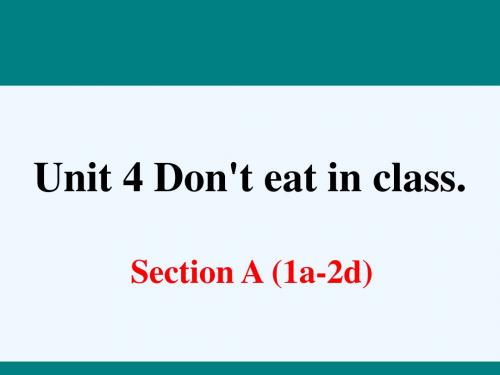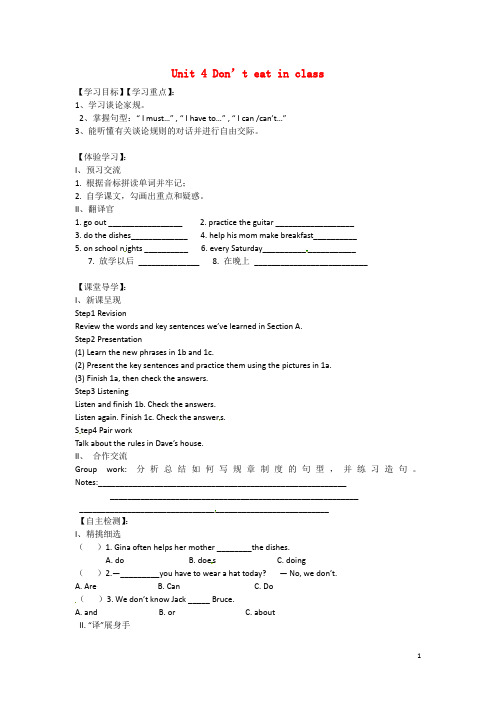七年级英语下册 Unit 4《Don’t eat in class》(第一课时)教案 (新版)人教新目标版
- 格式:doc
- 大小:62.50 KB
- 文档页数:6



Unit 4 Don’t eat in class.第一课时(Section A 1a-1c)【学习目标】1.学习常见的班规、校规的表达方式,初步认识祈使句的结构。
2.通过对规章制度的学习与讨论,规范自己的行为,以便自己和他人更好地遵守规章制度,养成良好的习惯。
【学习重点】★重点单词:rule(规则;规章), arrive(到达), hallway(走廊;过道), hall(大厅;礼堂), listen(听;倾听), fight (打架;战斗), sorry(抱歉的;难过的;惋惜的).★重点短语:on time (准时), dining hall(餐厅), listen to(听;倾听).★重点句型:1.— Don’t run in the hallways.(不要在走廊里乱跑。
)—Sorry, Ms. Clark.(对不起,克拉克老师。
)2.— What are the rules?(规则是什么?)—Well, we can’t arrive late for class. We must be on time.(嗯,我们上课不能迟到。
我们必须准时。
)【课前预习方案】(一)小小翻译官。
(请预习课文,将下列中文译成英文)1. 校规school rule2. 迟到arrive late3. 准时on time4. 在走廊里in the hallway5. 在教室里in the classroom6. 在餐厅里in the dining hall7. 听音乐listen to music 8. 在课堂上in class9. 打架;战斗fight 10. 必须做某事must do sth.11. 不要做某事don’t do sth. 12. 不能做某事can’t do sth.(二)请朗读1a方框中的校规,并把相关规则的序号写在图中违反规则的同学旁边。
(三)想一想。
在谈论校规和班规时,教师语言和学生语言是不同的,请你试着用情态动词can’t将下列规章制度改写成学生语言。


Unit 4 Don't eat in class.第一课时Section A(1a~2c)1.Key words and phrases:rule,arrive,hall,dining,listen,fight,sorry,outside,wear,important,bring,uniform,quiet,dining hall,arrive late for school,(be) on time,listen to…, go out,follow/break the rules,in class,be/keep quiet,a lot of,bring…to…,wear a hat,have to,music player2.Key sentences:(1)—Don't run in the hallways.—Sorry,Ms.Clark.(2)—What are(some of)the rules?—Well,we can't arrive late for class.(3)We must be on time.(4)We also have to be quiet in the library.3.Skills:(1)谈论校规,能正确使用否定祈使句陈述规章要求,对别人的劝告、警告做出礼貌回应。
(2)听清楚并能正确使用情态动词can,can't。
(3)能正确使用情态动词have to,must。
(4)能正确使用祈使句谈论规章制度。
4.Emotion:了解校规,规范在校行为。
5.The guidance of learning methods【学法指导】小组合作6.Learning important and difficult points【学习重难点】祈使句Don't…的用法。
(一)自主学习1.预习Page19-20中的生词,根据音标会读,知道汉语意思。

Unit 4 Don’t eat in class【学习目标】【学习重点】:1、学习谈论家规。
2、掌握句型:“ I must…” , “ I have to…” , “ I can /can’t…”3、能听懂有关谈论规则的对话并进行自由交际。
【体验学习】:I、预习交流1. 根据音标拼读单词并牢记;2. 自学课文,勾画出重点和疑惑。
II、翻译官1. go out _________________2. practice the guitar __________________3. do the dishes_____________4. help his mom make breakfast__________5. on school n ights __________6. every Saturday_____________________7. 放学以后______________ 8. 在晚上__________________________【课堂导学】:I、新课呈现Step1 RevisionReview the words and key sentences we’ve learned in Section A.Step2 Presentation(1) Learn the new phrases in 1b and 1c.(2) Present the key sentences and practice them using the pictures in 1a.(3) Finish 1a, then check the answers.Step3 ListeningListen and finish 1b. Check the answers.Listen again. Finish 1c. Check the answer s.S tep4 Pair workTalk about the rules in Dave’s house.II、合作交流Group work: 分析总结如何写规章制度的句型,并练习造句。
Unit 4《Don't eat in class》(第一课时)Learning GoalsThis lesson mainly studies the fourth unit the new words and phrases, From the first word of sound,to form and meaning, To basic usage. Take physical teaching, word-building teaching method, comparative method and other methods, learn the use of them and try to spell the words, grasps the meaning in this unit to talk about rules. Students try to learn how to read and remember the words and how to learn individually and collectively.Help students' language ability of expression of ascension.Teaching and learning stepsStep 1 Learn to read the words1. Ask students to read the words by themselves.2. Then read words in groups.3. Ask students to read students in front of the whole class.4. Listen to and read the words and correct your pronunciation.The teacher explained the pronunciation of words, emphasis on the pronunciation. 设计意图:利用音标读单词是一种能力,七年级学生这种能力差。
让学生学会试读单词是一种学习习惯的培养,首先学生自己根据音标读单词,并标出试读时有困难的。
接着两人一组或以小组为单位解决遇到的困难。
然后找单个同学读单词,教师及时更正错音,帮助学生正音。
最后让学生跟录音读。
如此几步的学习,大多数学生可以熟悉单词的读音,正确试读出单词。
最后还是不会的同学,就给他们找“老师”,他们组的组长就是他们的“老师”,负责课下教会他们。
单词的学习坚持从个体—同伴—小组—整体的原则,培养学生自主学习和小组互助学习的能力。
尽量培养学生利用音标读单词Step 2: Learn to remember words1.Remember the words by looking at pictures.Show pictures about some new words. For example:We can eat in the dining halldining hallCan we run in the hallways?hallwayDon’t listen to music in class.listen toCan you fight?fightI must do the dishes.dishesWe have to wear uniforms.wear uniformsMy mother makes breakfast in the kitchen.kitchenI must make my bed.make my bedI like reading.readShe has long hair.hair二.Remember the words by their similar pronunciations and forms.1. ruler rule room /u:/2. all hall tall /ɔːl /3. pear wear hair /eə/4. out outside around /aʊ/5. drive arrive ride / aɪ/6. bus luck cut /ʌ/三.Remember the words by conversion, complex words and derivative.1. important(重要)—unimportant2. bring(带来)----take3. quiet(安静)----noisy(吵闹的)4. dirty(脏的)----clean5. remember(记住)----forget6. follow(遵循)------break四. Remember the words by their Chinese.1. on time 准时2. practice 练习3. before 在…….以前4. relax 放松5. terrible 可怕的6. feel 感受,觉得7. be strict with sb 对某人要求严格8.keep 保持,保留9. learn 学习,学会10. luck 幸运,运气设计意图:记忆单词的方法很多,利用多种手段和多种形式呈现给学,来吸引学生的兴趣,降低难度扩大学生的词汇量。
例如:通过图画和简单的句子记忆,学生易于接受,印象深刻;不同的方法能使学生举一反三,极大的扩充词汇量;通过重点短语对比和汉意的方式全面的加深对词汇的理解。
)Step 3 Consolidation of wordsGive the students a few minutes to try to memorize the words first.1. Get the students to read the word by looking at the Chinese. Then look at the Chinese and say English.2. Then get them to work in pairs to spell the words or write down the words withthe Chinese given in guide books. Underline the words they haven’t grasped.3. Get the students to have a short dictation about the important words and phrases. If they can’t dictate after class in groups.4. Play a game “Translation”, who will be the first to answer after one speaks like this:设计意图:此环节为巩固单词。
通过两两提问或使用助学默写的形式来对单词加以巩固。
这一环节有一半的学生往往不达标,需要利用自习课或课余的时间让小组长跟踪检查,尽量能让再有一小半的学生顺利过关,其余的十几学生还需要时间和同学习们的帮助,教师应及时督促、让小组长反馈检查的结果,教师做好跟踪检查。
Step 4 Read the story and translate into Chinese:1. Get the students to read the story, and underline the new words.2. Translate the story into Chinese in groups of three.3. Read the story fluently by themselves.We are n’t happy. There are too many rules at school. Don’t arrive late for class. We must be on time. This is very important. We can’t run in the hallways. We can’t listen to music or eat in the classroom. We must eat in the dining hall and listen to music outside.We always have to wear the school uniform. We have to keep our hair short. We can’t bring music players to school. Don’t be noisy.We have to be quiet in the library. We can’t fight with classmates…There are also more rules at home. I have to make my bed every morning. After breakfast, I have to do the dishes. I can’t go out on the schools. I must do my homework first. After dinner, I can’t relax either. I must read books. I have to go to bed before10:00. On weekends, I must practice speaking English for an hour. Then I have to learn to play the piano. Rules, rules, rules!It’s terrible!And my parents are strict with me. I have to follow these rules. I feel tired. What can I do?译文:我们是不高兴的。
在学校有太多的规则。
上课不能迟到,我们必须准时。
这点很重要。
我们不能在走廊里跑。
我们不能在教室里听音乐或者吃东西。
我们必须在餐厅里吃和在外面听音乐。
在学校我们必须穿校服,必须留短发。
我们也不能把音乐播放器带到学校。
不能制噪音在图书馆必须保持安静。
不能好同学打架……。
在家也有太多的规则。
每天早上我必须整理床铺。
早餐后我必须洗碗。
在上学日我不能外出,我必须先做我的家庭作业。